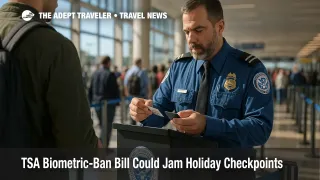TSA Biometric-Ban Bill Could Jam Holiday Checkpoints

A bipartisan push on Capitol Hill aims to slam the brakes on the Transportation Security Administration's rapid facial-recognition expansion. If the Traveler Privacy Protection Act freezes further rollouts and forces officers back to full manual ID checks, TSA's own goal of keeping PreCheck waits under ten minutes-and standard lanes under thirty-could be blown wide open. With airlines already projecting record passenger volumes, the timing could not be worse for travelers heading home over the long Thanksgiving weekend.
Key Points
- Why it matters: The bill would halt new facial-recognition units and mandate human ID checks.
- Travel impact: Manual processing threatens to lengthen all security lines, including PreCheck.
- What's next: Senate Commerce must decide whether to advance the measure before the holiday rush.
- Airlines and airports warn of staffing strains and higher costs.
- Privacy groups say the pause is essential to protect civil liberties.
Snapshot
Today, TSA promises to keep dedicated PreCheck lines under ten minutes and standard lanes under thirty, targets it still met during last year's record Thanksgiving crush. Those benchmarks are baked into staffing models, automated credential authenticator plans, and wait-time guarantees posted at major hubs. According to TSA PreCheck wait-time benchmarks, the ten-versus-thirty split remains the agency's gold standard for 2025. Any congressional freeze on facial recognition would put that math back on paper IDs, slowing the credential booths that now handle roughly two-thirds of travelers in large airports.
Background
Introduced by Senators Jeff Merkley (D-Ore.) and John Kennedy (R-La.), the Traveler Privacy Protection Act would stop TSA from deploying new biometric cameras until Congress sets explicit privacy rules. It makes human ID verification the default, limits biometric use strictly to identity matching, and orders immediate deletion of images. Supporters argue that unchecked face scans inch the United States toward a surveillance state. The full Traveler Privacy Protection Act bill spells out stiff reporting requirements and civil-rights safeguards while allowing opt-in biometrics for those who prefer them.
Latest Developments
Airline groups warn of longer lines
U.S. airline, airport, and tourism lobbies blasted the bill in a July 28 letter, saying it would "increase wait times considerably by slowing down identity verification at every airport security checkpoint." Carriers contend facial recognition is already cutting officer workload and smoothing peak-hour surges. They fear a blanket freeze could force TSA to redirect three-quarters of its budget back to frontline staffing, undermining e-gates and touchless PreCheck upgrades. The industry opposition letter reported by Reuters also argues the ban would hamstring future automated baggage drops and international arrivals processing.
Analysis
Thanksgiving is TSA's annual stress test. In 2024 the agency screened 18.3 million passengers between the Tuesday before the holiday and Cyber Monday, topping 3 million on the Sunday return. This year's volumes are expected to edge even higher. Manual credential checks add roughly 20-30 seconds per traveler versus automated face matching. Multiply that by three million passengers in a single day and you build an extra 17,000-25,000 agent hours-about the equivalent of staffing Los Angeles International Airport's checkpoints for four straight days. Airports with aging layouts like New York-LaGuardia and Chicago Midway have little spare queuing real estate; lines would spill into ticket halls, triggering missed flights and domino delays. The Washington Post overview reports 84 airports use facial recognition today, with plans for 400 by 2027. A sudden halt would strand hundreds of machines mid-installation and cancel upcoming PreCheck "Touchless ID" pilots, leaving travelers to wonder why promised efficiencies vanished just when they needed them most.
Final Thoughts
Congress faces a difficult trade-off: protect privacy or preserve efficiency. Unless lawmakers carve out a transitional period or fund thousands of extra officers, the TSA biometric-ban bill could transform a record-breaking Thanksgiving into an exercise in checkpoint endurance-and remind travelers how quickly a few seconds at the ID podium can snowball into hours of airport frustration, all in the name of the TSA biometric-ban bill.
Sources
- TSA PreCheck(R) reaches 20 million members - TSA
- Text of the Traveler Privacy Protection Act - Congress.gov
- US airlines oppose new limits on facial recognition - Reuters
- More airports are scanning faces; a new bill would limit the practice - Washington Post
- TSA readies for busiest Thanksgiving travel period - TSA
